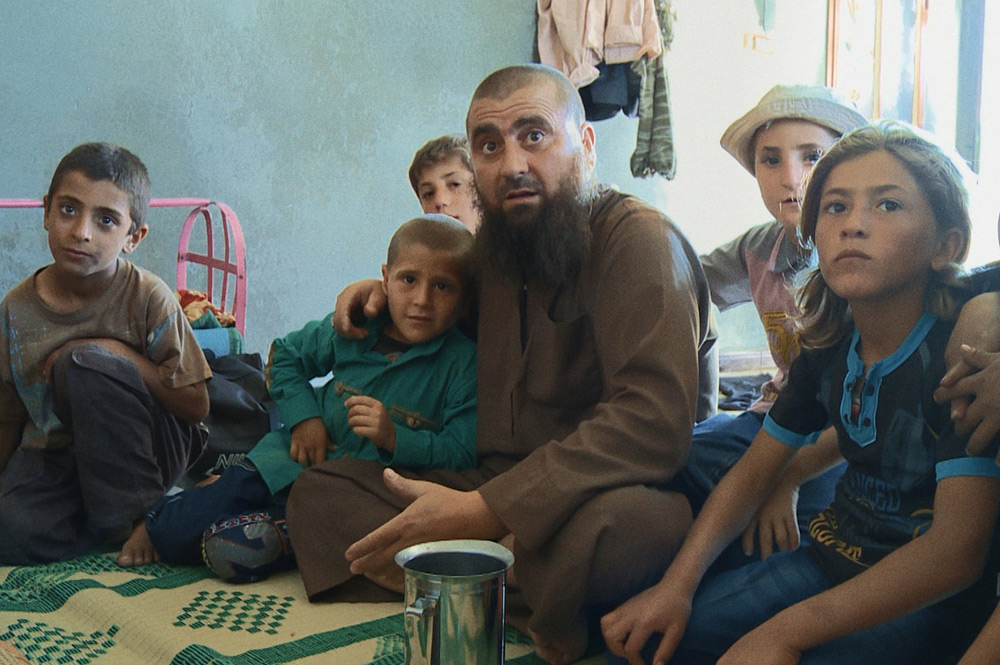“How does a man feel to see a country destroyed before his eyes?” asks Abu Osama, at a certain point in “Of Fathers and Sons.” It would seem to be a devastating question on the face of it, yet it is all the more so because (Talal Derki) the man filming Abu Osama was led to make “Of Fathers and Sons” because of asking the same of himself for completely opposite reasons. After risking life and limb to film in his native Syria for the 2013 documentary “Return to Homs,” chronicling the radicalization of Basit Sarout, a pacifist-turned-rebel insurgent, Derki, now living in Berlin, ventures back to embed with a family in a village where the peaceful Sofis once resided but now has become a stronghold for Islamic fundamentalists.
Other documentaries about the region have conveyed the severity of the war there through visceral footage of violent conflict, but Derki takes a different tact with “Of Fathers and Sons,” simply documenting the day-to-day life of Abu Osama, a founder of Al-Nusra, the Syrian arm of Al Qaeda and his eight young sons (by two wives he continues to be wed to in tandem). Of course, there was likely nothing simple about Derki making the film, with a brief voiceover explaining how he actually got such incredible access to this family, by introducing himself as a war photographer sympathetic to the Jihadis’ cause, but he presents them without cinematic affectation, letting it seep in how violent, misogynistic attitudes are passed down from one generation to another, using the shield of their religion as justification.
Casual conversations between the father and sons involve the children beheading birds to imitate their elders and being encouraged to throw rocks at their two-year-old niece for neglecting to wear a hijab. The father and his friend, a fellow religious zealot, think nothing of joking about how they’d torture a child, right in front of him, and when the boys naturally get into fights as a result of the example set by their fathers, they are whipped to keep them in line. And as children crawl in and around tanks that have been destroyed as if they were on a playground and create dirty bombs out of citric acid while their father inspects for land mines, you realize they know no other reality than that of war, ensuring that they’ll believe what they’re told because even the space their father can’t control is filled with dread. Although what’s on camera is bonechilling in how readily accepted this way of life is by all involved, Derki just as effective in what he chooses to leave out of the frame for most of the film, channeling the same tunnel vision that the boys have by largely keeping women offscreen, referred to only as targets of denigration, and keeping violence in the audience’s imagination in the way it likely still exists in their mind, though you see preparation for it all throughout, particularly once Abu Osama’s oldest, the 13-year-old Osama and the 12-year-old Ayman enlist in military camp.
Merely being present to bear witness to this side of the Syrian border would make “Of Fathers and Sons” well worth watching, but Derki is so scrupulous in what he reveals about how ingrained the beliefs of the Islamic jihadis are and why it’s unlikely the cycle of violence will be broken any time soon. However, that pit in your stomach doesn’t come from the thought of endless war. It’s because the broad strokes of a Jihadi parent’s relationship to their kids is not all that far removed from anyone else in the world in the desire to educate them. It’s what they teach them that’s different.
“Of Fathers and Sons” will show at the Sundance Film Festival on January 21st at noon at the Sundance Resort Screening Room, January 22nd at 11 a.m. at the Egyptian Theatre, January 24th at 8:30 a.m. at the Prospector Square Theater, January 26th at 10 p.m. at the Redstone Cinema 2 and January 27th at 11:45 a.m. at the Egyptian Theatre.





Comments 1